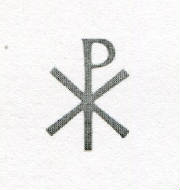Let's Put the "X" Back in "Xmas"
There are many who fervently believe that the
"X" in "Xmas" is crossing out Christ's name. And, according to them, that makes it a really bad
thing to do, much like shortening "God be with you" to "Good-bye." But what do they know?
First, understand that the Bible was not written in English... not originally.
Lots of things weren't. English is not that old. The origin of the English language
traditionally dates back to 1066 with the Battle of Hastings, easily a thousand years after Christ. (English
Language) Even at that, what they were speaking isn't even close to what we now call English. If
you went back in time and expected people to be able to understand you, first, go somewhere they actually spoke English.
Second, don't go before, say, 1500. If you were to go back to the early days of when the New Testament
was being written, around 50 AD, (History of the Bible) they were speaking Greek. Indeed, the word "Bible"
is of Greek origin. (Language of the New Testament)
The Greek word for Christ (in Greek) is
Χριστός
If you could find an original copy of the New Testament,
that's the word you're going to see. (Ambrosino)
Using "X" as an abbreviation for Christ goes back a long ways, too, all the way
back to Constantine the Great (not to be confused with his son, Constantine the OK). On October 28, 312 AD, Constantine
fought the superior forces of his nemesis Maxentius at the battle of Milivan Bridge. (The Battle of Milvian Bridge)
The night before Constantine had a vision, and in that vision God himself told Constantine to create a war banner with the
first two letters of Christ's name, which, in Greek, are chi and rho, "chi" being an X, and "rho" being
a P... like this:

If the above symbol doesn't look familiar to you, then
you've probably never been in a Christian church. By the way, Constantine won that battle, which is pretty much a forgone
conclusion if you have God on your side. (Ambrosino) Anybody who's seen the Indiana Jones movies knows that.
Another familiar symbol
for many Christians is
ΙΧΘΥΣ
This is actually an acronym
(in Greek), meaning "Jesus Christ, Son of God, Saviour." Yup. The "X" is short for "Christ."
(Ambrosino)
"Christmas" is a combination of the words "Christ" and
"Mass." Christ being... well... Jesus. And Mass means... well... mass –
a church service. In this case, it's a church service for Christ. At one time, especially
in the Catholic church, every saint had a day, and on that day a special mass was said for that particular saint. (Clark)
For instance, Michaelmas, honoring the Angel Michael (one of my favourites), and all the other Angels as well (after
all, there are over 10,000 saints recognized by the Catholic church), is celebrated by those who celebrate such things on
September 29. (Johnson)
The first recorded instance of "Xmas" being used for "Christmas" is in 1021, when a
thrifty scribe shortened it to "XPmas." And who can blame him? After all,
parchment paper was expensive, and not to be wasted. And he was probably copying the entire Bible by hand.
Anything that could be abbreviated was. Soon after the abbreviation was shortened even more, to
"Xmas." (Ambrosino) And, as they say, the rest is history.
So
if you're tired of the way Xmas has changed over the years, of how people have taken a once sacred holiday and made it into a farce... if you want to get back to the real meaning of Xmas, then it's time to put the "X"
back in Xmas.
Work Cited
Ambrosino,
Brandon. "The X in Xmas Literally Means Christ. Here's the History Behind It."
Vox. Voxmedia (14 Dec. 2014): n. pag. Web.
11 Dec. 2019 https://www.vox.com/2014/12/14/7374401/jesus-xmas-christmas
"The Battle of Milvian Bridge and the History of the Book." Library News.
University of Missouri (2019): n. pag. Web. 11 Dec. 2019 http://library.missouri.edu/news/special-collections/the-battle-of-milvian-bridge-and-the-history-of-the-book
Clark, Wayne. "What is the Meaning of 'Mas' in the Word Christmas?"
Quora. Quora: n. pag. Web. 11
Dec. 2019 https://www.quora.com/What-is-the-meaning-of-mas-in-the-word-Christmas
"English Language." Wikipedia. Wikipedia Foundation
(7 Dec. 2019): n. pag. Web. 11 Dec. 2019 https://en.wikipedia.org/wiki/English_language
"History of the Bible: New Testament." History World.
History World: n. page. Web. 11 Dec. 2019 http://www.historyworld.net/wrldhis/PlainTextHistories.asp?ParagraphID=adb1
Johnson, Ben. "Michaelmas." Historic UK.
Historic UK Ltd.: n. pag. Web. 11 Dec. 2019 https://www.historic-uk.com/CultureUK/Michaelmas/
"Language of the New Testament." Wikipedia. Wikipedia Foundation (5 Nov.
2019): n. pag. Web. 11 Dec. 2019 https://en.wikipedia.org/wiki/Language_of_the_New_Testament